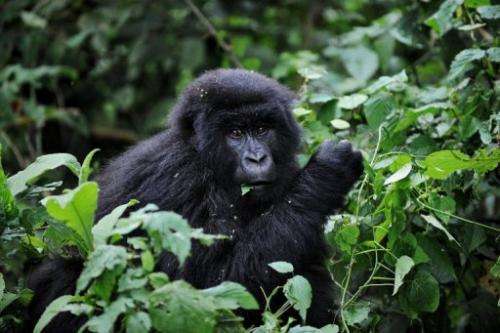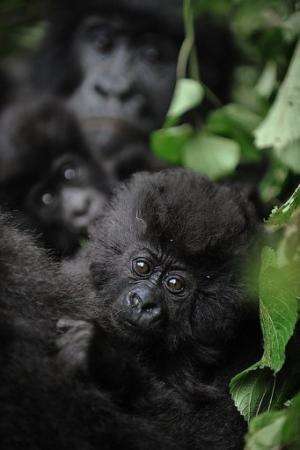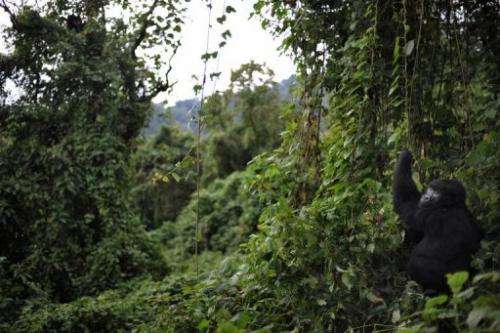File photo of a juvenile mountain gorilla feeding on leaves on the slopes of Mount Mikeno in the Virunga National Park. Home to the famed mountain gorillas, Africa's oldest national park in the Democratic Republic of Congo has been overrun by armed groups who have slaughtered wildlife and scared off much-needed tourists.
Home to the famed mountain gorillas, Africa's oldest national park in the Democratic Republic of Congo has been overrun by armed groups who have slaughtered wildlife and scared off much-needed tourists.
For Belgian park director Emmanuel de Merode and his staff it is a time of great uncertainty and anxiety.
Last month, they were forced to spend an entire day sheltering in a cellar while the army and rebels battled nearby.
"They let me know that we were not part of their conflict," said Merode, a 42-year-old white African, adding that the park's new luxury tourist lodge was nevertheless standing empty as a result of the fighting.
Straddling DR Congo, Rwanda and Uganda, the Virunga volcanoes conservation area is home to 480 of the world's 790 remaining mountain gorillas made famous by US zoologist Dian Fossey, who was murdered in 1985.
But in recent months, dozens of animals have been killed by armed groups including the DR Congo army, whom an environmental group has accused of poaching under orders from officers who charge a fee to local poachers in a protection racket.
Baby gorillas play in a clearing on the slopes of Mount Mikeno in the Virunga National Park. In recent months, dozens of animals have been killed by armed groups including the DR Congo army, whom an environmental group has accused of poaching under orders from officers who charge a fee to local poachers in a protection racket.
"It takes a few months to kill everything and 40 years to put things back the way they were," Merode said.
Hippopotami, chimpanzees, elephants, antelopes, birds and a lion have all been slaughtered since the fighting began.
Created in 1925, Virunga National Park is home to Lake Edward, which in 1980 was the world's most important hippopotamus sanctuary with 27,000 of the animals. There are now fewer than 300, according to Merode.
In July, during a lull in fighting, rangers began searching rebel-held jungle for six families of the critically endangered mountain gorillas that had not been spotted since fighting erupted in April between the regular army and the M-23 militia led by a renegade general.
In order to begin the search for the missing primates, Merode had to secure agreement from both the army and the M23 rebels.
A gorilla picks foliage to eat in a clearing on the slopes of Mount Mikeno in the Virunga National Park. Created in 1925, Virunga National Park is home to Lake Edward, which in 1980 was the world's most important hippopotamus sanctuary with 27,000 of the animals. There are now fewer than 300, according to Merode.
More than half the gorillas were found and two births were recorded, although rangers' fears were far from allayed.
The fighting has wiped out tourism in the area, depriving the park of a vital source of donations needed to help keep the rangers working.
"Even in the best of times, keeping Virunga's rangers fully funded is a challenge, but with tourism closed because of the war, it has become nearly impossible," Merode wrote in his blog.
"Periods of conflict are when the rangers' jobs are most dangerous—and most necessary. At times like these, opportunists abound and poaching, illegal animal trafficking, and habitat destruction become especially difficult to control," he added.
Visitor numbers had risen from 550 in 2009 to 3,300 in 2011, with tourist dollars helping to fund schools and hospitals for local people.
For now, however, the tree-top terrace at the newly opened tourist lodge remains deserted.
(c) 2012 AFP
























